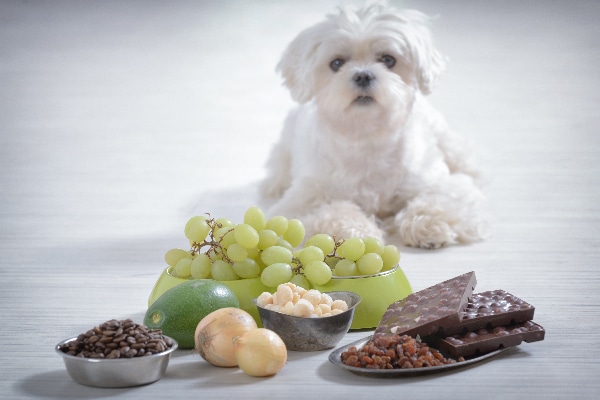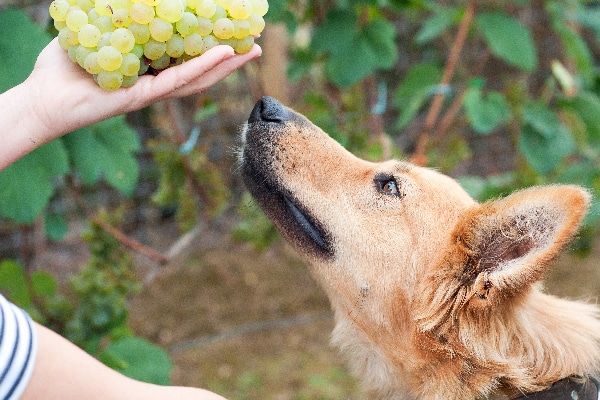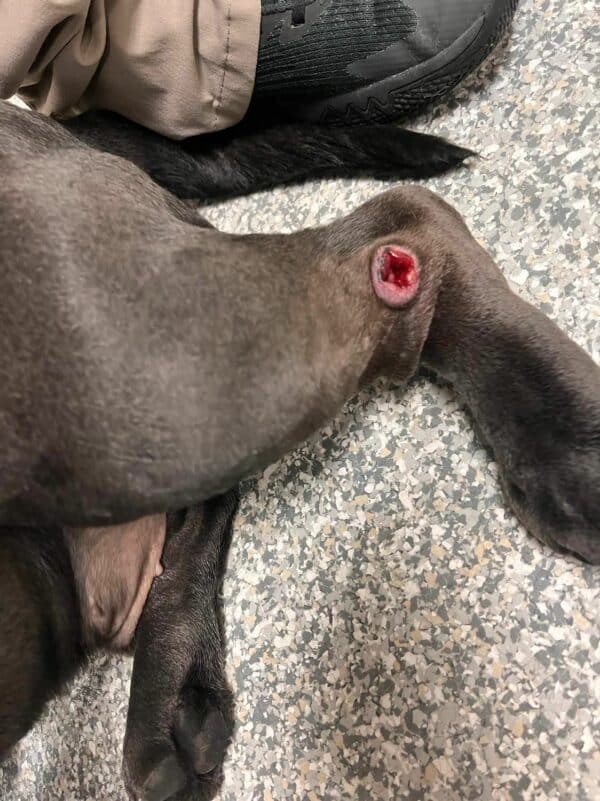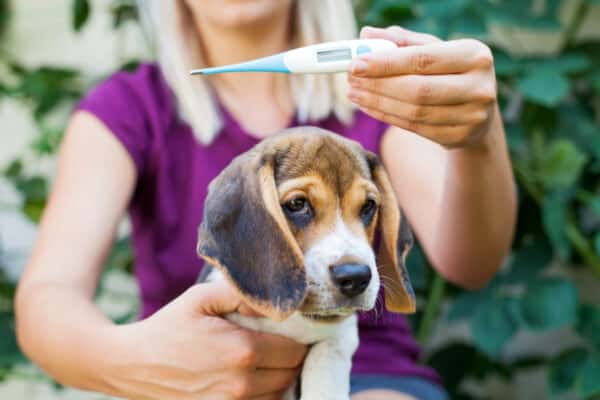Fruits and vegetables can — sometimes — make great snacks to share with our dogs. However, as with any human foods, it’s important to know which fruits and vegetables are safe to share since some human foods are toxic to dogs. Grapes are a delicious and sweet snack that many of us two-legged creatures enjoy in their red, green, black, white, seedless and seeded varieties. But can dogs eat grapes? What about their dried version, raisins? Can dogs eat raisins? Here’s everything you need to know about grapes and dogs, and raisins and dogs:
First off, can dogs eat grapes?

“For reasons that still aren’t clear to the veterinary world, grapes and raisins are toxic to dogs and can result in acute (sudden) kidney failure,” says Dr. Heather B. Loenser, DVM Senior Veterinary Officer of the American Animal Hospital Association (AAHA). So, to be clear, the answer to “Can dogs eat grapes” is a very hard no.
So, why can’t dogs eat grapes?
“There are many theories as to what the toxic compound is (pesticides, fertilizers, mold, heavy metals) but no one knows for sure,” Dr. Loenser says. One of the most concerning things about grapes and dogs is that it can only take a few grapes or raisins to make a dog very sick. So, no amount of grapes or raisins are safe for dogs. “The toxic dose is also not known and dogs have been sickened by eating just a few grapes or raisins,” explains Dr. Loenser.
Symptoms that your dog ate grapes or your dog ate raisins
If your dog ate grapes or your dog ate raisins, you might notice the following symptoms within the first 12 to 24 hours. If you see any of these symptoms take your dog to the veterinarian immediately:
- Vomiting
- Lack of appetite
- Lethargy
- Diarrhea
Acute signs of grapes or raisin toxicity, which include signs of kidney failure, can be seen 24 to 48 hours after the dog eats the grapes or raisins and include:
- Vomiting
- Lack of appetite
- Nausea
- Diarrhea
- Lethargy
- Excessive thirst
- Abdominal pain
- Excessive urination
- Urine-like odor on the breath
- Weakness
- Tremors
- Seizures
These symptoms can lead to coma and death. If you see any of these symptoms, rush your dog to the veterinarian.
What should you do if your dog ate grapes or raisins?
If your dog has consumed grapes or raisins, or if you even suspect that your dog has eaten grapes or raisins, monitor your dog to see if you need to seek medical attention right away.
Not all dogs react, but if your dog has a reaction, your dog needs immediate medical attention. Veterinarians aren’t sure what dose of grapes or raisins is toxic — whether it’s one grape/raisin or a bunch of grapes/raisins — but it does seem like dogs are more likely to react if they eat a larger amount of grapes/raisins or if the dog is particularly sensitive to grapes/raisins. If your dog is particularly sensitive, just a few grapes or raisins could be toxic.
Monitor your dog closely for the above symptoms and call your veterinarian or the ASPCA’s Animal Poison Control Center Hotline at 888-426-4435 (Note: There is a consultation fee for the hotline). Dr. Loenser noted that your veterinarian will likely instruct you on how to induce vomiting and then you should “proceed to the veterinary hospital, if directed, for care, which may include IV fluids and bloodwork.”
How to prevent your dogs from eating grapes and raisins in the first place
Like any other toxin, the easiest way to protect your dog is to prevent her from having access to the toxic grapes or raisins. This means ensuring that small children eating those snacks are supervised so they don’t share grapes or raisins with dogs, and that you closely monitor your dog in situations when grapes or raisins are present. Grapes are often included in fruit salads and in barbecue dishes, while raisins are frequently baked into desserts, so it’s important to pay special attention to your dog at any gathering where you aren’t sure of the ingredients in all the dishes.
Dr. Loenser also offered this practical suggestion for how she keeps her own dogs safe from the risks associated with grapes: “While many people have ‘peanut-free’ or ‘gluten-free’ homes, my house is a ‘grape-free home’ because of my two curious dogs,” Dr. Loenser explains.
Want to learn more about which fruits are safe to share with your dog?
This article takes a look at which fruits your dog can eat — and which fruits are toxic.
Read more about what dogs can eat on Dogster.com:
Can Dogs Eat …
Sassafras Lowrey is an award-winning author. Her novels have been honored by organizations ranging from the Lambda Literary Foundation to the American Library Association. Sassafras is a Certified Trick Dog Instructor, and assists with dog agility classes. Sassafras lives and writes in Brooklyn with her partner, a senior Chihuahua mix, a rescued Shepherd mix and a Newfoundland puppy, along with two bossy cats and a semi-feral kitten. Learn more at sassafraslowrey.com
Featured Image Credit: Irantzu_Arbaizagoitia | iStock / Getty Images Plus.





